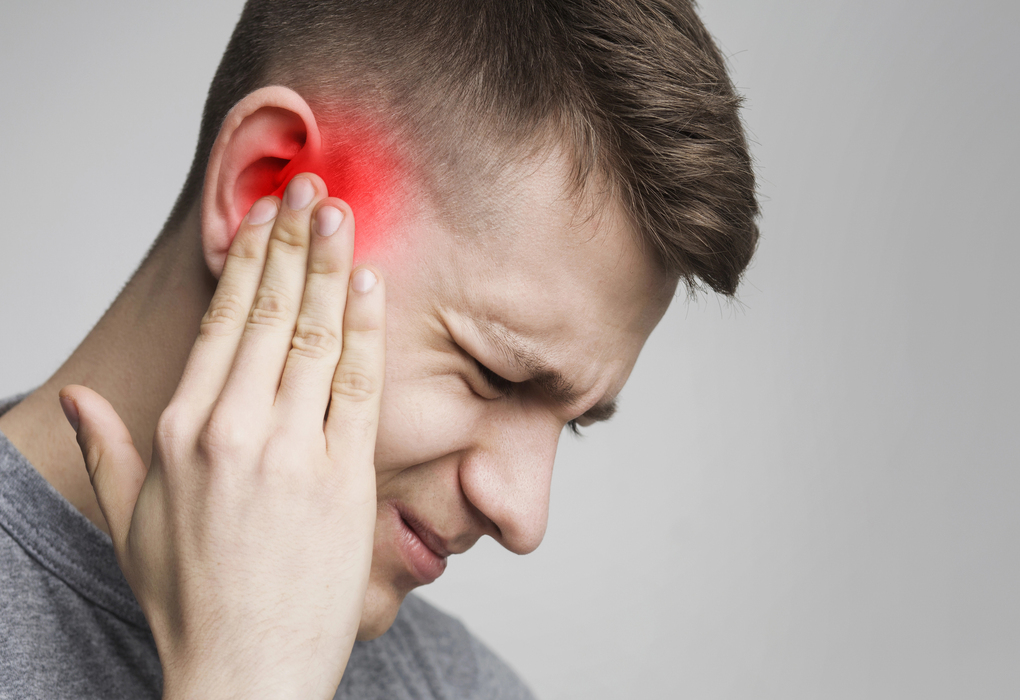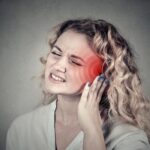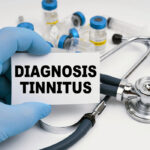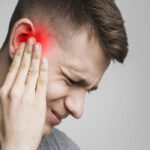Key Takeaways
- Tinnitus (ear buzzing) can be caused by hearing loss, exposure to loud noises, ear infections, or certain medications, and affects millions of people worldwide.
- Simple relief methods include white noise machines, relaxation techniques, and avoiding caffeine and alcohol, which can reduce the perception of tinnitus symptoms.
- Natural remedies like ginkgo biloba, certain essential oils, and specific dietary changes may help manage ear buzzing for some individuals.
- See a doctor if ear buzzing is accompanied by sudden hearing loss, dizziness, or starts after a head injury, as these could indicate serious medical conditions.
- Long-term management strategies include protecting your hearing, managing stress, and using cognitive behavioral therapy techniques to reduce tinnitus impact on daily life.
What Causes the Buzzing in Your Ears?

“FF: this little bee hung out in my …” from www.reddit.com and used with no modifications.
That persistent buzzing, ringing, or hissing in your ears has a name: tinnitus. It’s not actually a disease but a symptom that something else might be going on in your body. When you experience these phantom sounds that nobody else can hear, it can range from mildly annoying to completely disruptive to your daily life. Understanding what’s behind your ear buzzing is the first step toward finding relief.
Millions of people worldwide experience tinnitus, with about 15-20% of the population reporting some form of it. For most, it’s temporary and barely noticeable. For others, it becomes a constant companion that affects sleep, concentration, and overall quality of life. The good news is that numerous strategies can help reduce or manage these unwanted sounds.
Tinnitus Explained: More Than Just Ringing
Tinnitus manifests in various ways, not just as the stereotypical ringing that many associate with the condition. Some people describe their tinnitus as buzzing, like an electrical hum or the sound of insects. Others experience whistling, roaring, clicking, hissing, or even musical sounds. The intensity can fluctuate throughout the day, often becoming more noticeable in quiet environments or when you’re trying to fall asleep.
Inside your ear, thousands of tiny hair cells detect sound waves and transform them into nerve signals that travel to your brain. When these delicate cells are damaged or irritated, they can send random electrical impulses to your brain, which interprets these signals as sound—even when no external sound is present. This “false alarm” from your auditory system is what creates tinnitus symptoms.
What makes tinnitus particularly challenging is its subjective nature. Since only you can hear it, measuring or quantifying it objectively becomes difficult for medical professionals. This subjectivity also means that treatment approaches need to be personalized based on your specific experience and the underlying causes of your tinnitus.
- Subjective tinnitus: Only you can hear it (most common type)
- Objective tinnitus: Rare form where a doctor can actually detect the sound during an examination
- Pulsatile tinnitus: Rhythmic sounds that often match your heartbeat
- Somatic tinnitus: Sounds that can be influenced by movement of your jaw, neck, or eyes
- Musical tinnitus: Rare form where you hear musical notes or melodies
Common Medical Causes of Ear Buzzing
The most common cause of tinnitus is noise-induced hearing loss, which occurs after exposure to loud sounds that damage those sensitive hair cells in your inner ear. However, numerous other medical conditions can trigger ear buzzing. Age-related hearing loss (presbycusis) often brings tinnitus along as an unwanted companion as you get older. Ear infections or excess earwax can create pressure on your eardrum and auditory canal, resulting in temporary tinnitus that typically resolves when the underlying issue is treated.
Ménière’s disease, an inner ear disorder characterized by vertigo, hearing loss, and tinnitus, affects the fluid balance in your inner ear and can cause episodes of severe tinnitus. Temporomandibular joint (TMJ) disorders can also trigger tinnitus due to the close proximity of jaw joints to your ear structures. Less commonly, acoustic neuromas (benign tumors on the vestibular nerve), blood vessel disorders, or head and neck injuries might be responsible for your ear buzzing. For those exploring alternative treatments, some people consider CBD oil for tinnitus relief.
Medications That Can Trigger Ear Noises
Many people are surprised to learn that their ear buzzing might be coming from their medicine cabinet. Certain medications can cause or worsen tinnitus as a side effect. These are known as ototoxic drugs, meaning they can damage your inner ear or the nerve that connects your ear to your brain. The effect is often temporary and subsides when you stop taking the medication, but in some cases, it can be permanent. For more insights on managing tinnitus, consider exploring the Starkey Livio AI management options.
High doses of aspirin, NSAIDs like ibuprofen, certain antibiotics (particularly aminoglycosides like gentamicin), some cancer medications, diuretics, antimalarial drugs, and certain antidepressants are among the known potential culprits. If you suspect your medication might be causing your tinnitus, never stop taking it without consulting your healthcare provider first. They can help determine if your medication is the likely cause and suggest alternatives if appropriate.
Environmental Factors and Lifestyle Triggers
Your environment and daily habits can significantly influence tinnitus symptoms. Exposure to loud noises is perhaps the most obvious environmental trigger—whether it’s a one-time event like a concert or ongoing exposure in a noisy workplace. Even everyday sounds like lawn mowers, power tools, or headphones played at high volumes can damage your hearing and trigger tinnitus. This is why hearing protection is essential in noisy environments.
Lifestyle factors also play a crucial role in tinnitus severity. Stress is a well-known amplifier of tinnitus—when you’re stressed, your body’s fight-or-flight response can increase awareness of the sound and make it seem louder. Poor sleep quality creates a vicious cycle where tinnitus makes it hard to sleep, and lack of sleep makes tinnitus seem worse. Certain substances like caffeine, alcohol, and nicotine can temporarily worsen symptoms in some people by affecting blood flow to your ear or stimulating your nervous system. High sodium intake may also exacerbate symptoms, particularly for those with Ménière’s disease.
10 Quick Relief Methods for Ear Buzzing
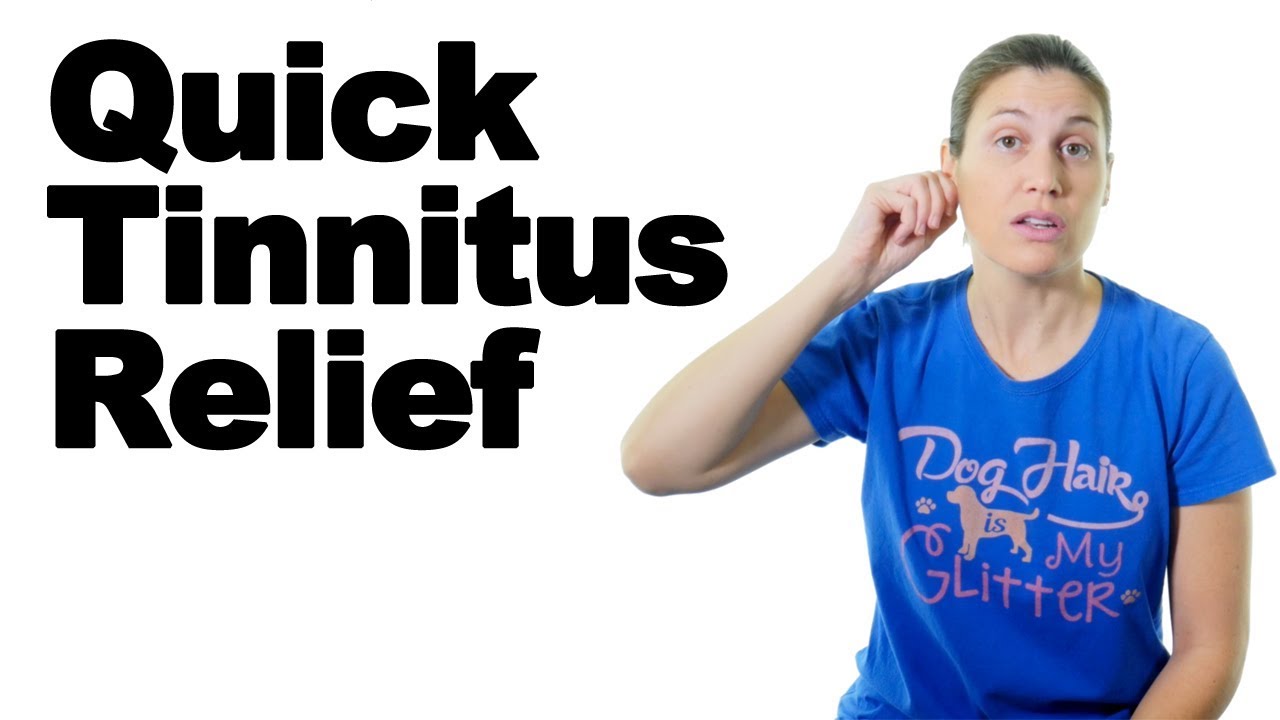
“Easy Tinnitus Treatment – Ask Doctor Jo …” from www.youtube.com and used with no modifications.
When ear buzzing strikes, you need solutions that work quickly to provide some relief. While these methods may not eliminate tinnitus completely, they can significantly reduce your awareness of the sound and make it more manageable. Each person responds differently to various relief strategies, so it’s worth trying several approaches to find what works best for your specific situation.
1. White Noise Machines and Sound Masking
White noise machines can be incredibly effective at masking the sound of tinnitus by creating a consistent, neutral background sound that helps distract your brain from focusing on the ear buzzing. These devices produce a steady stream of sound across all audible frequencies, effectively drowning out the tinnitus. Many people find that falling asleep becomes much easier when using a white noise machine, as it prevents the tinnitus from seeming louder in quiet environments.
You don’t necessarily need to purchase a dedicated white noise machine, as there are many smartphone apps that offer various sound masking options. Some people prefer pink noise (which emphasizes lower frequencies), brown noise (even deeper than pink noise), or nature sounds like rainfall or ocean waves. The key is finding a pleasant sound that effectively masks your tinnitus without being distracting itself. For those interested in exploring additional relief methods, transcendental meditation has been known to alleviate symptoms for some individuals.
2. Deep Breathing and Relaxation Techniques
The relationship between stress and tinnitus creates an opportunity for relief through relaxation techniques. When you’re stressed, your body’s fight-or-flight response increases blood pressure and heightens awareness of sensory input—including tinnitus. Deep breathing exercises activate your parasympathetic nervous system (the “rest and digest” mode), which can help reduce the perceived intensity of tinnitus almost immediately.
Try this simple 4-7-8 breathing technique: inhale quietly through your nose for 4 counts, hold your breath for 7 counts, then exhale completely through your mouth for 8 counts. Repeat this cycle 3-4 times whenever tinnitus feels overwhelming. Progressive muscle relaxation, where you systematically tense and release muscle groups throughout your body, can also help reduce overall tension that may be exacerbating your tinnitus.
3. Limiting Caffeine and Alcohol
Both caffeine and alcohol can affect tinnitus symptoms, though the relationship varies significantly from person to person. Caffeine can constrict blood vessels and temporarily raise blood pressure, potentially increasing tinnitus volume for some individuals. Similarly, alcohol can alter blood flow to your inner ear and affect the volume of fluid in your inner ear, which may temporarily worsen tinnitus symptoms.
Consider tracking your tinnitus symptoms alongside your consumption of these substances to identify any patterns. Many people find that reducing or eliminating caffeine after midday improves their tinnitus, especially at night. With alcohol, moderation is key—some people notice increased ear buzzing even after just one drink, while others only experience effects after heavier consumption. For alternative approaches, some individuals explore acupuncture for tinnitus as a potential remedy.
4. Background Music or Nature Sounds
Similar to white noise but more pleasant for many people, low-volume background music or nature sounds can effectively mask tinnitus throughout the day. The ideal sound environment provides enough auditory stimulation to distract from the tinnitus without being so loud that it causes additional hearing strain. Many streaming services offer specially designed tinnitus relief playlists featuring ambient music, gentle nature sounds, or specially engineered soundscapes.
For sleeping, continuous sounds like rainfall, gentle streams, or soft wind through leaves work well because they don’t have sudden changes in volume that might disturb sleep. Some people find that audiobooks or podcasts at a low volume provide enough vocal variety to distract from tinnitus while falling asleep. The key is finding something pleasant that diverts attention away from the internal sound.
5. Gentle Ear Massage
Gentle massage around the ear area can provide temporary relief for some tinnitus sufferers, particularly those whose symptoms are related to jaw tension or temporomandibular joint (TMJ) disorders. Using your fingertips, apply light pressure in circular motions around the ear, including the mastoid bone behind the ear, the temple area, and along the jawline. This can help relax tense muscles and temporarily improve blood flow to the area. For more insights, explore how transcendental meditation alleviates tinnitus symptoms.
Another technique involves gently pulling your ears outward and massaging the small indentation where your ear connects to your head (just above the earlobe). Some people report immediate, though temporary, reduction in tinnitus symptoms after these simple massages. For more insights, you can explore common tinnitus questions answered by top audiologists. As with any self-treatment, start gently and stop if you experience any pain or if symptoms worsen.
Natural Remedies to Reduce Tinnitus Symptoms
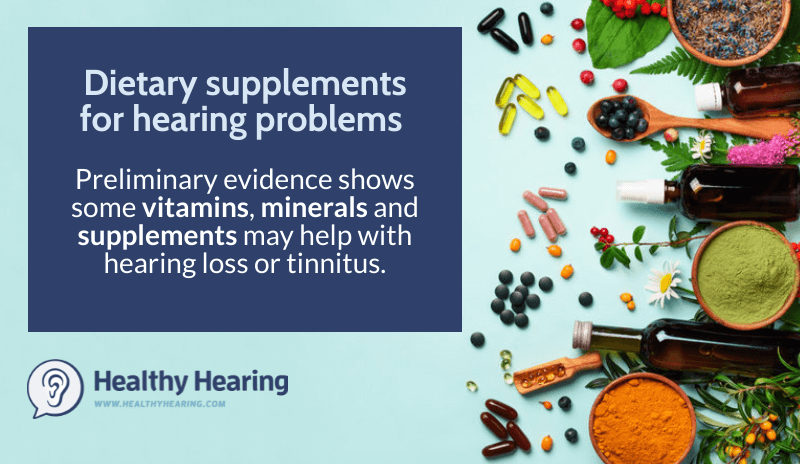
“Hearing loss supplements and herbal …” from www.healthyhearing.com and used with no modifications.
While scientific evidence for natural remedies varies, many people with tinnitus report finding relief through certain herbs, supplements, and alternative approaches. These natural options may be particularly appealing if you’re looking to minimize medication use or complement conventional treatments. Always consult with your healthcare provider before starting any new supplement, especially if you’re taking other medications, as interactions are possible.
Ginkgo Biloba and Other Herbal Options
Ginkgo biloba has been one of the most studied herbs for tinnitus relief, with some research suggesting it may improve circulation to the brain and inner ear. This ancient Chinese herb contains flavonoids and terpenoids that act as antioxidants and may help protect the delicate structures of the inner ear from damage. While clinical studies show mixed results, some people report noticeable improvement when taking standardized ginkgo extract consistently for several weeks.
Other herbs that some tinnitus sufferers find helpful include black cohosh, which may improve blood flow; hawthorn, traditionally used for circulatory support; and pycnogenol (pine bark extract), which has anti-inflammatory properties. Zinc supplements may also benefit people whose tinnitus is related to zinc deficiency, though this is not common. As with any supplement, quality matters—look for standardized extracts from reputable manufacturers, and be patient as natural remedies often take time to show effects.
Essential Oils That May Help
Certain essential oils may help manage tinnitus symptoms through their relaxing, anti-inflammatory, or circulation-enhancing properties. Helichrysum oil has been traditionally used to improve circulation and reduce inflammation, while cypress oil may help improve blood flow to the ear area. Lavender and basil oils are particularly valued for their stress-reducing properties, which can indirectly help with tinnitus by lowering overall tension and anxiety that often amplify symptoms. For those exploring alternative treatments, acupuncture for tinnitus offers additional insights into managing this condition.
To use essential oils safely, dilute them properly in a carrier oil like jojoba or coconut oil before applying behind the ears or to the neck and temples. Alternatively, use them in a diffuser to create a relaxing atmosphere that may help distract from tinnitus sounds. Never put essential oils directly into the ear canal, as this can cause serious damage. Always perform a patch test first to ensure you don’t have an allergic reaction to any new oil.
Acupressure Points for Ear Relief
Traditional Chinese Medicine offers several acupressure points that may provide relief from tinnitus symptoms. The “ear gate” point, located in the hollow just in front of where your earlobe connects to your head, is specifically associated with ear problems including tinnitus. Applying gentle but firm pressure to this point for 2-3 minutes several times daily may help reduce the intensity of ear buzzing for some people.
Other potentially beneficial acupressure points include the “windscreen” point at the base of the skull in the hollow between the two vertical neck muscles, and the “heavenly pillar” points located on either side of the spine just below the base of the skull. Some people also find relief by gently massaging the “three-mile point” located four finger widths below the kneecap and one finger width to the outside of the shinbone. While scientific evidence for acupressure remains limited, these techniques are generally safe to try and may provide relief through improved energy flow and relaxation.
Many tinnitus sufferers combine several natural approaches for the best results. A holistic strategy might include taking appropriate supplements, using essential oils for relaxation, practicing acupressure techniques, and making dietary changes. Remember that natural doesn’t always mean risk-free—herbal supplements can have side effects and interactions just like conventional medications.
- Start with one natural remedy at a time to identify what works for you
- Keep a journal to track changes in your tinnitus symptoms
- Give natural remedies adequate time to work (typically 4-6 weeks)
- Combine complementary approaches for potentially better results
- Always inform your healthcare provider about any supplements you’re taking
The effectiveness of natural remedies varies greatly from person to person. What works wonderfully for one individual may have little effect on another, highlighting the importance of personalized approaches to tinnitus management. Patience and persistence are key—finding the right combination of natural strategies that work for your specific situation may take time but can lead to significant improvement in your symptoms and quality of life.
Dietary Changes That Can Help Quiet the Noise

“Is there a tinnitus diet?” from www.healthyhearing.com and used with no modifications.
What you eat can have a surprising impact on your tinnitus symptoms. Many people report noticeable differences in ear buzzing intensity based on their diet. While food triggers vary from person to person, certain dietary modifications have shown promising results for managing tinnitus symptoms across numerous patient experiences.
Foods That May Worsen Tinnitus
Salt is one of the most common dietary culprits that can exacerbate tinnitus. High sodium intake can affect fluid regulation in your body, potentially increasing pressure in your inner ear and worsening tinnitus symptoms. Processed foods, canned soups, and fast food are typically high in sodium and may trigger more intense ear buzzing in sensitive individuals.
Sugar and artificial sweeteners can cause blood sugar fluctuations that some people find intensifies their tinnitus. MSG (monosodium glutamate), commonly found in Asian cuisine and many processed foods, is another potential trigger as it’s an excitatory neurotransmitter that may increase neural activity, including in auditory pathways. Tyramine-rich foods like aged cheeses, red wine, and smoked meats have also been reported to worsen symptoms in some people.
- High-sodium foods (processed foods, canned goods, salty snacks)
- Caffeine (coffee, tea, energy drinks, chocolate)
- Alcohol (especially red wine and beer)
- Foods containing MSG
- Artificial sweeteners (aspartame, sucralose)
- Tyramine-rich foods (aged cheese, cured meats)
Vitamins and Minerals That Support Ear Health
Certain nutrients play important roles in maintaining proper auditory function and may help reduce tinnitus symptoms. Zinc is essential for proper immune function and has been found to be deficient in some people with tinnitus. Studies suggest zinc supplementation may help those whose tinnitus is related to deficiency, though it’s not beneficial for everyone.
Magnesium helps regulate nerve signals and has been shown to protect against noise-induced hearing loss in some research. Vitamin B12 is crucial for maintaining the myelin sheath that protects nerve fibers, including those in your auditory system. A deficiency can contribute to tinnitus in some cases, making B12-rich foods like fish, meat, eggs, and dairy (or supplements for those on plant-based diets) potentially beneficial. Antioxidants found in colorful fruits and vegetables may help combat oxidative stress that can damage the delicate structures in your inner ear.
When to See a Doctor About Ear Buzzing
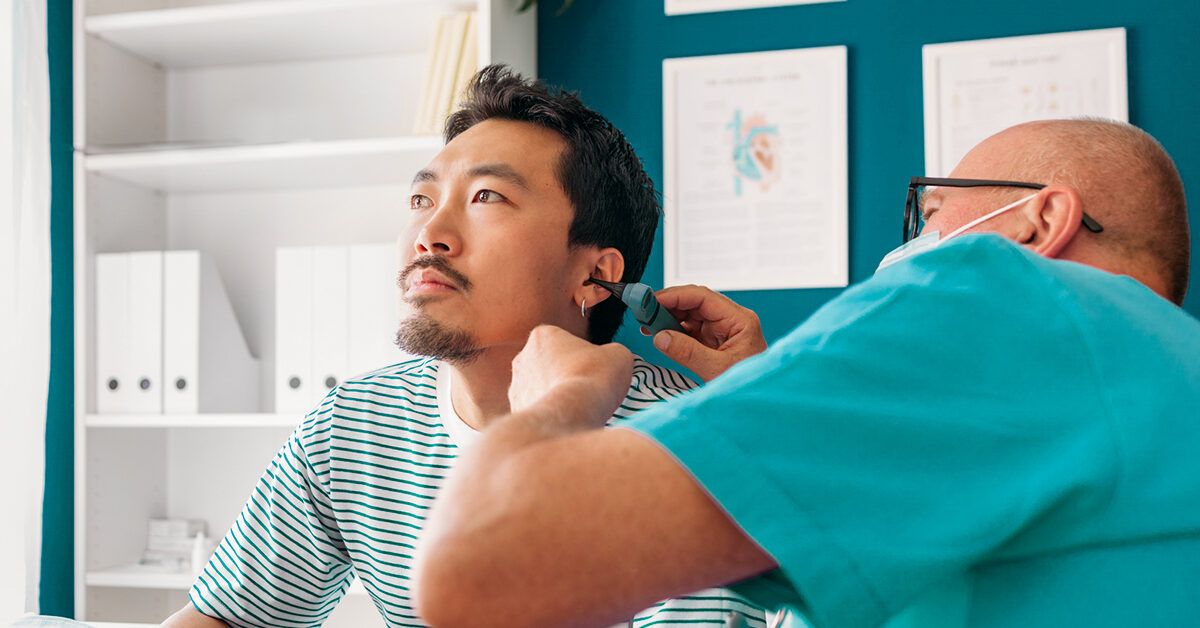
“Tinnitus (Ringing in Ears): Types …” from www.healthline.com and used with no modifications.
While many cases of tinnitus are annoying but harmless, certain circumstances warrant prompt medical attention. Understanding when to seek professional help ensures you don’t overlook potentially serious underlying conditions that may be causing your ear buzzing.
Warning Signs That Require Medical Attention
If your tinnitus begins suddenly and is accompanied by hearing loss, dizziness, or vertigo, you should see a doctor immediately as these could indicate an acoustic neuroma or Ménière’s disease. Pulsatile tinnitus—where the sound pulses in time with your heartbeat—should always be evaluated promptly as it could indicate vascular problems, high blood pressure, or even a vascular tumor. Ear buzzing that begins after a head injury requires immediate medical attention to rule out serious trauma to the auditory system or brain.
One-sided tinnitus that develops over days or weeks, especially if accompanied by any facial weakness, should trigger a doctor visit as this pattern could indicate an acoustic neuroma or other serious conditions. Similarly, if your tinnitus is severely affecting your quality of life, causing significant distress, or interfering with sleep and daily activities, professional help is appropriate even if there are no other concerning symptoms.
Tests Your Doctor Might Perform
Your doctor will likely begin with a comprehensive hearing test (audiogram) to assess any hearing loss and determine if this might be contributing to your tinnitus. They may perform otoscopy, examining your ear canal and eardrum with a lighted instrument to check for blockages, infections, or structural abnormalities. Tympanometry measures how your eardrum responds to slight pressure changes and can help identify middle ear problems.
For more complex cases, your doctor might order imaging tests like MRI or CT scans to look for structural abnormalities that could be causing your symptoms. Blood tests might be recommended to check for conditions like anemia, vitamin deficiencies, or thyroid problems that can contribute to tinnitus. In some cases, specialized tests like auditory brainstem response (ABR) or electrocochleography might be used to evaluate how sound signals travel through your auditory system.
Medical Treatments for Persistent Tinnitus

“New Tinnitus Treatment: 2025 Edition …” from neuromedcare.com and used with no modifications.
When tinnitus persists despite self-care measures, medical interventions can provide significant relief. The treatment approach typically depends on any underlying conditions identified and the severity of your symptoms. Modern medicine offers several effective options for managing chronic tinnitus.
Hearing Aids and How They Help
For many people with tinnitus related to hearing loss, hearing aids can provide remarkable relief. These devices amplify external sounds, making them more noticeable than the internal tinnitus sounds and helping your brain focus on real environmental sounds instead. Many modern hearing aids include built-in “tinnitus maskers” that generate white noise or customized sounds designed specifically to mask your particular type of tinnitus.
The fitting process involves not only addressing your hearing loss but also programming the device to provide optimal tinnitus relief. Audiologists specializing in tinnitus management can fine-tune these settings to your specific needs. Many patients report that their tinnitus becomes less noticeable almost immediately after being fitted with appropriate hearing aids, with benefits continuing to improve over time as the brain adjusts to the new auditory input.
Sound Therapy Devices
Specialized sound therapy devices go beyond simple white noise machines by producing customized sounds designed to interfere with your specific tinnitus frequency. Notched music therapy, for example, plays music with the frequencies of your tinnitus filtered out, which may help retrain your brain to ignore these frequencies over time. Another approach called “habituation therapy” uses precisely matched sounds to help your brain learn to classify tinnitus as an unimportant background noise that can be tuned out.
Neuromodulation devices represent the cutting edge of tinnitus treatment technology. These devices deliver precisely timed sounds paired with electrical stimulation to the tongue or skin, potentially helping to “reset” the abnormal neural activity causing tinnitus. While still emerging, early research shows promising results for some patients with this approach. Your audiologist or ENT specialist can recommend appropriate sound therapy options based on your specific tinnitus characteristics. For more insights, explore the Lenire device efficacy review to understand what every tinnitus patient needs to know.
Cognitive Behavioral Therapy Approaches
Cognitive Behavioral Therapy (CBT) has emerged as one of the most effective treatments for managing the distress associated with tinnitus. While it doesn’t eliminate the sound itself, CBT helps you change your relationship with the sound and reduce the negative emotional response to it. A trained therapist will guide you through techniques to identify and challenge unhelpful thought patterns about your tinnitus, replacing catastrophic thinking with more balanced perspectives.
CBT for tinnitus typically includes relaxation training, attention-control techniques, and cognitive restructuring to help you develop a healthier response to the presence of tinnitus. Many patients report significant improvements in quality of life, sleep, and emotional well-being after completing a course of CBT, even when the volume of their tinnitus remains unchanged. This approach acknowledges that while the sound itself might persist, its impact on your life can be dramatically reduced. For further insights, you might consider exploring how audiologists address common tinnitus questions.
Protecting Your Ears to Prevent Worsening Symptoms
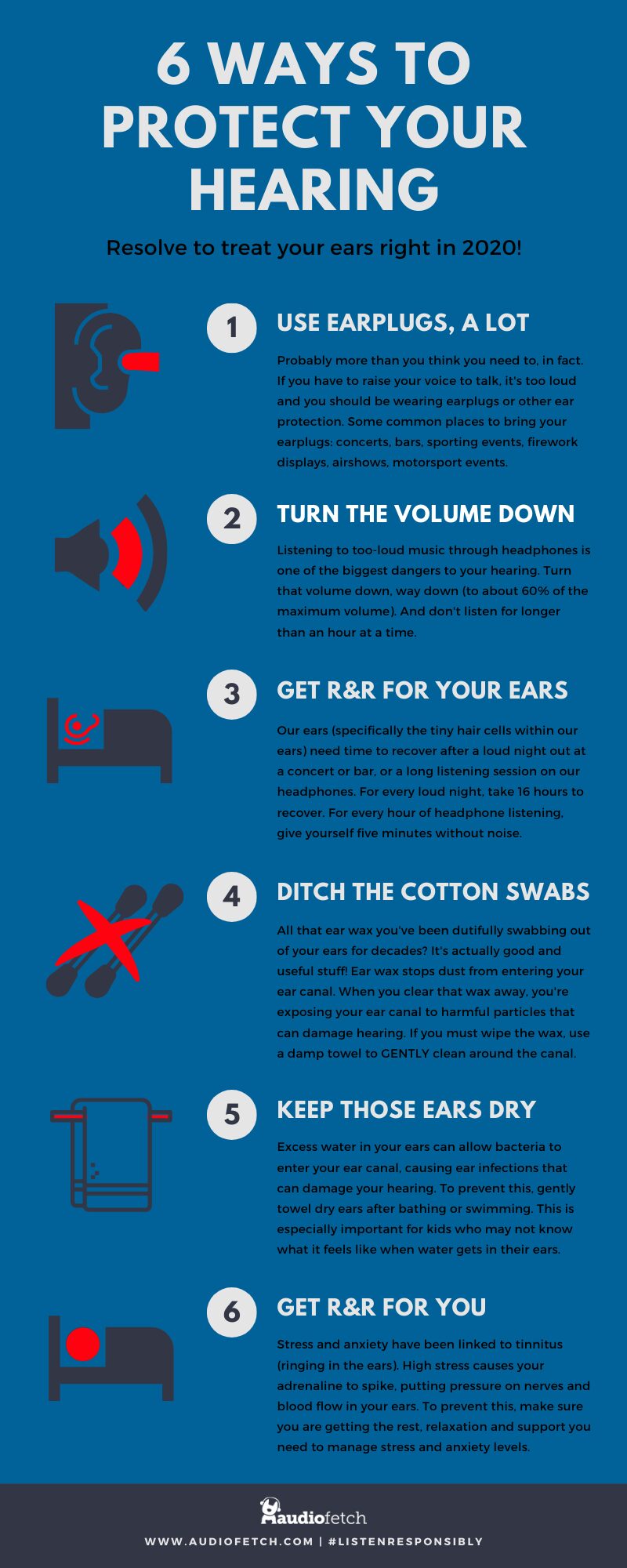
“6 Ways To Protect Your Hearing …” from www.audiofetch.com and used with no modifications.
Prevention is a crucial aspect of tinnitus management. Protecting your hearing from further damage not only prevents tinnitus from worsening but may also help your auditory system recover in some cases. Making hearing protection a habit now can save you from increased symptoms later.
Safe Listening Habits
The 60/60 rule provides a simple guideline for headphone use: listen at no more than 60% of maximum volume for no more than 60 minutes at a time. After an hour of listening, give your ears a break for at least 10-15 minutes to allow recovery. Over-ear headphones are generally safer than earbuds as they don’t place the sound source as close to your eardrum and provide some isolation from external noise, reducing the need to turn up the volume. For those experiencing tinnitus, exploring common tinnitus questions can provide valuable insights into managing this condition.
Be mindful of everyday noise exposure from household appliances and tools. Hair dryers, blenders, lawn mowers, and power tools can produce potentially damaging noise levels with prolonged exposure. When possible, choose quieter appliances and keep maintenance up-to-date on tools to minimize noise. For unavoidable loud activities, wear appropriate hearing protection.
- Keep volume below 60% on personal audio devices
- Take listening breaks every 60 minutes
- Choose over-ear headphones instead of earbuds when possible
- Use noise-canceling headphones in loud environments rather than turning up volume
- Position speakers at ear level rather than louder than necessary
Distance matters significantly when it comes to noise exposure. The intensity of sound decreases by half when you double your distance from the source. At concerts or sporting events, try to position yourself at a reasonable distance from speakers or noisy equipment. Even moving 10-20 feet farther away from a loud sound source can significantly reduce your risk of hearing damage.
Consider using smartphone apps that measure decibel levels to become more aware of potentially harmful environments. Most health experts recommend limiting exposure to sounds above 85 decibels (approximately the noise level of heavy city traffic) and wearing protection for anything louder. Many venues and activities routinely exceed this threshold, including concerts, sporting events, movie theaters, fitness classes, and restaurants during peak hours.
Proper Ear Protection in Noisy Environments
Not all hearing protection is created equal. Foam earplugs, when inserted properly, can reduce noise by 20-30 decibels and are inexpensive and disposable. The key to effectiveness is proper insertion—roll the earplug into a thin cylinder, pull your ear up and back to straighten the ear canal, insert the earplug, and hold it in place while it expands. Many people don’t insert foam earplugs deeply enough for optimal protection.
For musicians, concert-goers, or others concerned about sound quality, musician’s earplugs provide more even sound reduction across frequencies, preserving sound clarity while reducing volume. Custom-molded earplugs offer the best combination of comfort and protection for those with regular noise exposure. Though more expensive initially, they last for years, fit perfectly, and can be designed with filters for specific activities. For extremely loud environments like shooting ranges or when operating heavy machinery, combine earplugs with over-ear protection for maximum safety. For those interested in tinnitus management, exploring advanced hearing solutions can be beneficial.
Living Well With Tinnitus: Long-Term Management
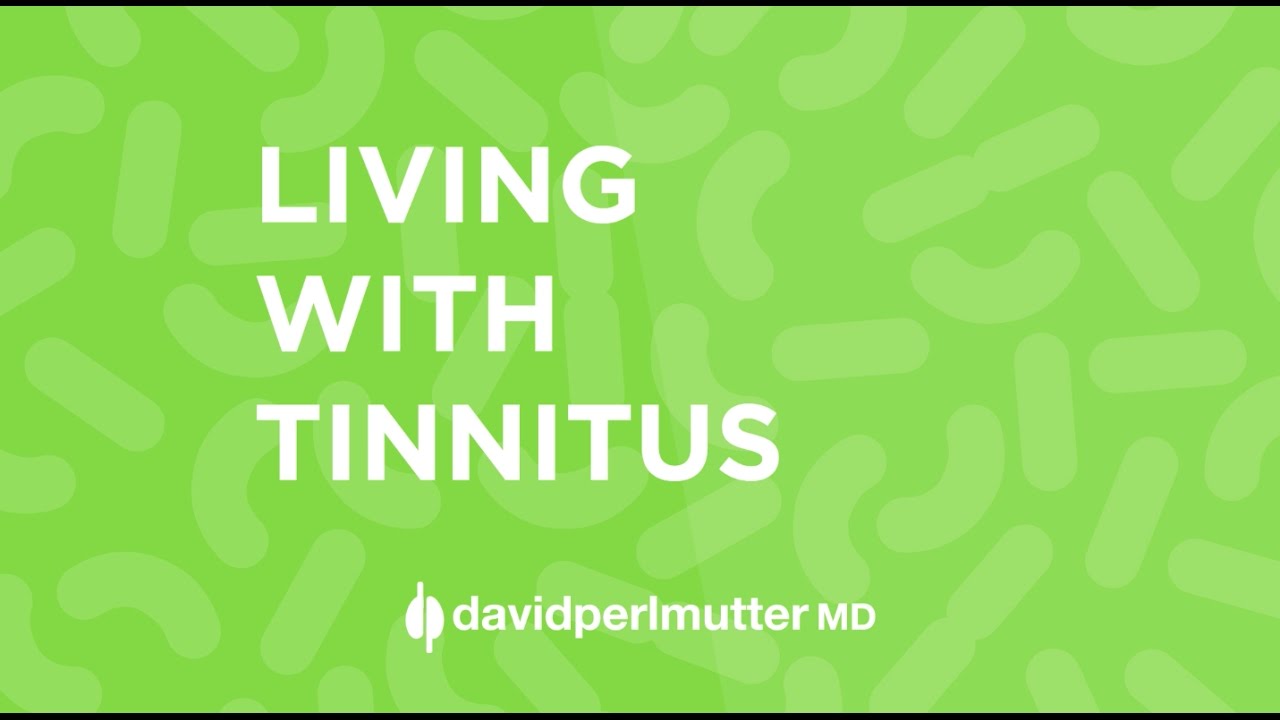
“Living with Tinnitus – David Perlmutter …” from drperlmutter.com and used with no modifications.
For many people, tinnitus becomes a permanent companion. The good news is that with proper management strategies, its impact on your quality of life can diminish significantly over time. The brain has remarkable adaptability, and many tinnitus sufferers find that their perception of the sound and their emotional response to it improves with consistent management efforts.
Developing a personalized tinnitus management plan often involves combining several approaches, from sound masking and stress management to dietary adjustments and proper hearing protection. Be patient with yourself during this process, as finding the right combination of strategies takes time. Many people report that while their tinnitus doesn’t disappear completely, it eventually fades into the background of their awareness rather than dominating their attention.
Sleep Strategies When Ear Buzzing Keeps You Awake
Sleep disruption is one of the most common and distressing aspects of tinnitus. Create an optimal sleep environment by using a sound machine, fan, or specialized pillow speakers that provide comfortable sound masking without disturbing your sleep partner. Establish a consistent pre-sleep routine that includes relaxation techniques like gentle stretching, meditation, or warm baths to lower your overall arousal level before bed.
Stress Management Techniques
Since stress often amplifies tinnitus perception, developing a robust stress management practice is essential for long-term tinnitus management. Mindfulness meditation has shown particular promise for tinnitus sufferers by training the brain to observe sensations without emotional reactivity. Even brief daily sessions can help you develop a more accepting relationship with tinnitus sounds.
Regular physical activity releases tension, improves sleep quality, and produces endorphins that can improve your overall mood and resilience. Aim for at least 30 minutes of moderate activity most days of the week, choosing activities you enjoy to ensure consistency. Yoga combines physical movement with breathing awareness and can be particularly beneficial for managing the physical manifestations of stress that often accompany and exacerbate tinnitus. For those interested in alternative treatments, exploring acupuncture for tinnitus may provide additional relief.
Support Groups and Resources
Connecting with others who understand your experience can provide invaluable emotional support and practical advice. The American Tinnitus Association offers online forums, local support groups, and evidence-based resources to help you navigate life with tinnitus. Many people find that simply knowing they’re not alone in their experience provides significant relief from the isolation that often accompanies chronic tinnitus. For additional insights, you might explore common tinnitus questions answered by top audiologists.
Frequently Asked Questions
Tinnitus generates many questions, from concerns about its progression to queries about specific treatments. Understanding these common concerns, such as the management of tinnitus with Starkey Livio AI, can help you better manage your condition and know when to seek additional support.
Here are answers to some of the most frequently asked questions about ear buzzing and tinnitus, based on current medical understanding and research.
Can tinnitus go away on its own?
Temporary tinnitus, such as the kind experienced after concert exposure or during an ear infection, often resolves on its own within hours to days once the underlying cause is addressed. However, tinnitus that persists for more than three months is considered chronic and less likely to disappear completely without intervention. Even chronic tinnitus can fluctuate in intensity over time, with many people experiencing periods where it’s barely noticeable followed by flare-ups during stress or illness. For those seeking alternative treatments, some have explored options like acupuncture for tinnitus to manage their symptoms.
The brain’s natural habituation process means that many people find their awareness of and distress about tinnitus diminishes over time, even if the actual sound remains. This neurological adaptation is similar to how you eventually stop noticing the sound of a refrigerator running or traffic outside your window. Supporting this natural habituation process through sound therapy, stress management, and cognitive techniques can significantly improve your experience even when the tinnitus itself persists.
Is ear buzzing a sign of hearing loss?
While not all tinnitus indicates hearing loss, there is a strong correlation between the two conditions. Approximately 90% of people with tinnitus have some degree of hearing loss, though many may not be aware of it because the hearing loss affects only certain frequencies or is relatively mild. When hair cells in the inner ear are damaged, they can send random electrical impulses to the brain that are interpreted as sound—the buzzing, ringing, or hissing of tinnitus—even when no external sound is present. For more insights, you can explore common tinnitus questions answered by top audiologists.
Does stress make tinnitus worse?
Yes, stress has a significant impact on tinnitus perception for most sufferers. When you’re stressed, your body’s fight-or-flight response increases alertness to potential threats, including heightening sensitivity to sensory input like the sound of your tinnitus. Stress also tends to increase muscle tension, particularly in the neck and jaw, which can directly influence tinnitus in some people. Additionally, stress often disrupts sleep patterns, creating a vicious cycle where poor sleep increases tinnitus awareness, causing more stress and anxiety, further worsening both sleep and tinnitus. For more insights on managing stress and tinnitus, you might consider exploring transcendental meditation techniques.
Are there any foods that can reduce tinnitus symptoms?
While no specific food has been scientifically proven to reduce tinnitus across all patients, many people report symptom improvement when following an anti-inflammatory diet rich in omega-3 fatty acids, antioxidants, and whole foods. Fatty fish like salmon, sardines, and mackerel provide omega-3s that may help reduce inflammation throughout the body, including in the auditory system. Fresh fruits and vegetables, particularly those rich in antioxidants like berries, dark leafy greens, and colorful vegetables, may help protect against oxidative damage to the delicate structures of the inner ear.
Some tinnitus sufferers report benefits from including potassium-rich foods like bananas, potatoes, and spinach, which help regulate fluid balance in the body and may influence inner ear fluid pressure. The most effective dietary approach for tinnitus management appears to be highly individualized—keeping a food diary to track how specific foods affect your symptoms can help you identify your personal triggers and beneficial foods.
Can children experience tinnitus or ear buzzing?
Yes, children can and do experience tinnitus, though they may describe it differently or not mention it at all if they assume everyone hears these sounds. Research suggests that up to 35% of children may experience tinnitus at some point, though the prevalence of troublesome tinnitus is much lower. Children today face increasing risk factors for tinnitus, including the widespread use of personal audio devices often played at unsafe volumes and participation in loud recreational activities like concerts, sporting events, and gaming with headphones.
Signs that a child might be experiencing tinnitus include covering their ears in normal environments, becoming upset in certain sound environments, having difficulty concentrating, or complaining about noises in their head or ears. Children with tinnitus should receive a comprehensive hearing evaluation and appropriate management strategies, which may need to be adapted to their developmental level. Teaching children about hearing protection early in life is crucial for preventing tinnitus and hearing loss that could affect them throughout their lifetime.
Remember that while tinnitus can be frustrating, most people find significant relief through a combination of medical treatments, lifestyle adjustments, and coping strategies. Working with healthcare providers specializing in auditory disorders gives you the best chance of developing an effective management plan tailored to your specific situation. For more information, you can explore resources on tinnitus management.
Tinnitus is a common condition that causes a ringing or buzzing sound in the ears. It can be caused by a variety of factors, including exposure to loud noises, ear infections, and certain medications. Understanding the underlying causes of tinnitus is crucial for effective management and treatment. For more detailed information, you can explore the comprehensive guide on tinnitus provided by Johns Hopkins Medicine.
